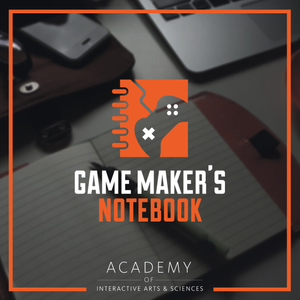
Season V, Episode 10: I Am Delighted to Say I Had Absolutely Nothing to Do With “Custer’s Revenge”
Explicit content warning
05/14/18 • 95 min
Staying motivated in the games industry must sometimes be hard. Especially if you were an adventure game developer in the late 90s and being told that your beautifully hand-painted 2D game had to change into an ugly, polygonal mess before any publishers would so much as deign a glance in its direction.
“Ship it.”Charles Cecil lived through all of this and somehow manages to keep his spirits up. In fact, seemingly effortlessly so.
If you are unfamiliar with Revolution Software, let me give you a quick up-to-speeder:
Besides this chilling visage of disaster, Revolution Software also brought you titles such as Lure of the Temptress, Beneath a Steel Sky, and In Cold Blood. In fact, thanks to their flagship series, Broken Sword, they are regularly mentioned alongside the ruling kings of the graphic point-and-click era, Sierra and LucasArts.
Charles founded Revolution Software and has a hands-on approach in everything they do, and still seems to have the same jubilant approach to it as he did when the company first saw the light of day back in 1990.
Our goal with having Charles on the show was quite simply to talk about, once again, the state of the industry — but this time from the perspective of someone who has been there from the start, all the way up through the glory days of the early 90’s, the terrible slump of the late 90’s and early 2000’s, up to the resurgence of the adventure game genre from 2012 onwards.
Sadly, due to scheduling conflicts and possibly gonorrhea, Gareth was unable to join us for this chat. But, while there are no dubious sound board clips of Dutch porn this time, there’s still more than enough English quips and polite mannerisms to go around, owing to our interview subject’s joyful demeanor.
Please enjoy this unfold on ye olde YubTubs:
Or in audio form below the post.
Only one more regular episode to go for this season, and after that we are reviving an old tradition of inviting as many people as can possible fit into one voice chatroom and trying to keep them from talking over each other. Yes, we’re bringing back the End-of-Season Roundtable! Stay tuned for all of this in the coming two weeks.
Staying motivated in the games industry must sometimes be hard. Especially if you were an adventure game developer in the late 90s and being told that your beautifully hand-painted 2D game had to change into an ugly, polygonal mess before any publishers would so much as deign a glance in its direction.
“Ship it.”Charles Cecil lived through all of this and somehow manages to keep his spirits up. In fact, seemingly effortlessly so.
If you are unfamiliar with Revolution Software, let me give you a quick up-to-speeder:
Besides this chilling visage of disaster, Revolution Software also brought you titles such as Lure of the Temptress, Beneath a Steel Sky, and In Cold Blood. In fact, thanks to their flagship series, Broken Sword, they are regularly mentioned alongside the ruling kings of the graphic point-and-click era, Sierra and LucasArts.
Charles founded Revolution Software and has a hands-on approach in everything they do, and still seems to have the same jubilant approach to it as he did when the company first saw the light of day back in 1990.
Our goal with having Charles on the show was quite simply to talk about, once again, the state of the industry — but this time from the perspective of someone who has been there from the start, all the way up through the glory days of the early 90’s, the terrible slump of the late 90’s and early 2000’s, up to the resurgence of the adventure game genre from 2012 onwards.
Sadly, due to scheduling conflicts and possibly gonorrhea, Gareth was unable to join us for this chat. But, while there are no dubious sound board clips of Dutch porn this time, there’s still more than enough English quips and polite mannerisms to go around, owing to our interview subject’s joyful demeanor.
Please enjoy this unfold on ye olde YubTubs:
Or in audio form below the post.
Only one more regular episode to go for this season, and after that we are reviving an old tradition of inviting as many people as can possible fit into one voice chatroom and trying to keep them from talking over each other. Yes, we’re bringing back the End-of-Season Roundtable! Stay tuned for all of this in the coming two weeks.
Previous Episode

Season V, Episode 9: I Can See What I Was Trying to Do, But I Wish I Hadn’t Done It
We’ve all been there. We’re playing a game from a bygone era — perhaps one we remember fondly — and thinking to ourselves, “Wouldn’t it be great if someone updated this for the modern era?”
And then, having thought this, perhaps even out loud, we immediately stop and think: “No, wait. This game is so much a product of its time. How would that ever work?”
Daniel Stacey must have thought both of these things many times. As a beta-tester on AGDI’s remake of King’s Quest I, he submitted a test report that largely amounted to him saying, “Look, this is pretty good, but you could have done so much more with the story,” to which the AGDI people said, “Fine. You do it.”
And so he did.From then on, Daniel has been the lead writer on multiple projects for AGDI — which later went commercial and changed their name to Himalaya Studios — including, but not limited to, King’s Quest II VGA, King’s Quest III VGA, Al Emmo and the Lost Dutchman’s Mine, and the upcoming adventure/RPG hybrid Mage’s Initiation.
He also enjoys pointing at jam.Daniel joins us for a frank discussion about the creative process behind taking an existing story that’s barebones, if not to say borderline non-existent (e.g. King’s Quest II) and turning it into a compelling, driving narrative (“I don’t know, I just sort of do it”).
It’s worth noting, of course, that Fred mainly drives this conversation, being the only person of the three hosts who has bothered to actually play both the original and remade versions of King’s Quest II. It is, of course, no less interesting for this reason, because Fred is also operating on about five hours of sleep at the time of this recording, making the proceedings both informative and extraordinarily silly.
Today’s episode is brought to you by the fine folks of Eat Pant Ltd. and is, of course, available on the YubTubs, or in delicious audio-only format at the bottom of this post.
The Patreon exclusive this week is also a staggering 20 minute meditation on the fact that we, indeed, had to get up very early for this. And that it’s all somehow my fault. (It wasn’t.)
Next Episode

Season V, Episode 11: Bechdel Designers
“Diversity” has become one of those words so overused in such inappropriate ways that it’s almost lost all meaning. But it does mean something. What is it? And how does it apply to narrative gaming? We invited Jess Haskins along to find out.
There is so much nonsense talked about diversity, and we were determined this week to have a serious – well, as serious as we can ever muster – discussion about it. Diversity is about more than form filling and tokenism. Of course it is. Simply throwing in “the black girl” into a story doesn’t make a game diverse. Similarly, the existence of characters from non-traditional backgrounds isn’t some form of “reverse racism”.
We met Jess at AdventureX 2017 where she gave one of the standout talks of the weekend.
Jess is all about building believable and representative worlds, and you can find her work at Paperback Studio’s website. If you have a game and need editorial assistance, writing guidance, or just want a specialist to give your stuff a quick look over – hit her up.
We’ve never tried on this podcast to tick boxes. A quick run down of our guests – and a look at the main hosts – will show we are far from achieving any sort of gender parity. In the main, we talk to people we find interesting. Who are we kidding. In the main, we talk to people who are stupid enough to give up their time to us.
But if you want to learn about how to do this whole writing computer games business, you want to get as many perspectives as possible. And that means talking to people who aren’t exactly like you. By doing that, we’ve made contact with people we otherwise wouldn’t have met, had great conversations and – I hope – made a load of new friends.
So. Enjoy a conversation about diversity. Not a diverse podcast.
If you like this episode you’ll love
Episode Comments
Generate a badge
Get a badge for your website that links back to this episode
<a href="https://goodpods.com/podcasts/back-seat-designers-291315/season-v-episode-10-i-am-delighted-to-say-i-had-absolutely-nothing-to-38157377"> <img src="https://storage.googleapis.com/goodpods-images-bucket/badges/generic-badge-1.svg" alt="listen to season v, episode 10: i am delighted to say i had absolutely nothing to do with “custer’s revenge” on goodpods" style="width: 225px" /> </a>
Copy




